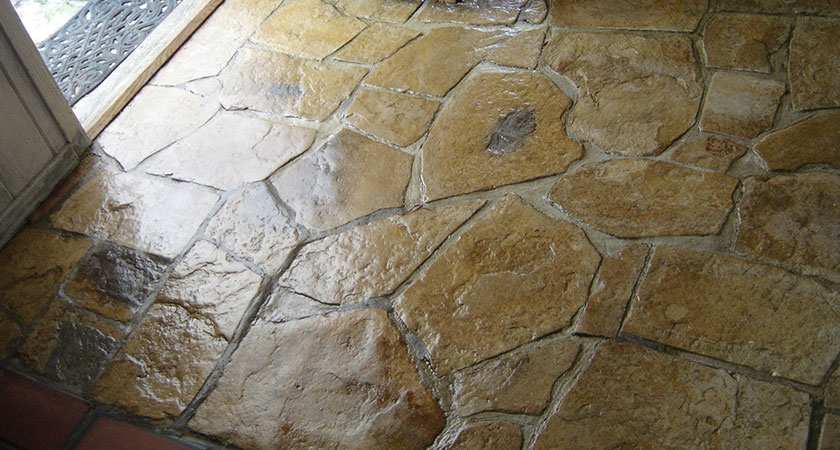
The shale from which slate originate were deposited previously on clay beds. Subsequent earth movements tilted these beds of shale, at first horizontal, and the intense metamorphism that converted these into slates folded and contracted them. Slate, then, belongs to the metamorphic group of rocks and can be defined as a fine grain rock derived from clays and shale and possessing a cleavage that permits it to be split into thin sheets. INTERIOR use only slates are designates with an “I” or “interior” on specification sheets. EXTERIOR use is labels as either “E” or “exterior” on specification sheets.
Natural Stone Restoration Care’s method for cleaning existing Slate tile will depend on its current condition and what type of sealer was previously used. These are general methods and results will vary.
Bare (uncoated) Slate: We use light abrasives and a cleaning solution to loosen the dirt and debris from the stone and grout.
Previously coated Slate where the coating is still generally intact: We will use appropriate grit strength to clean surface dirt without removing the existing coating and prepare for a recoat with surface sealer.
Previously coated Slate with coating breakthrough and bare spots: This will usually require stripping of the existing coating as much as possible and aggressive cleaning before it is ready for a re-application of a surface or penetrating sealer.
In many instances we will use our powerful high pressure extraction cleanup machine to remove slurries created during the cleaning and stripping steps. The use of a powerful vacuum system such as ours is key to providing the best cleaning possible and insuring a clean and even sealer application.
Sealing
Two sealing options: Penetrating sealer or a topcoat/surface sealer:
Penetrating sealers are clear and soak into the Slate with no change to appearance. The function of the penetrating sealer is to fill the pores and make the Slate less absorbent, keeping spills to the surface only. Keep in mind that all natural stone is porous; staining is still possible depending on what is spilled.
Penetrating sealers mixed with oil will darken & enrich the various colors in Slate but won’t add any shine. Think of it as moisturizer for the Slate. A penetrating sealer will help keep liquid spills on top of the stone rather than soaking in. It is important to note that penetrating sealers are not bulletproof, and all natural stone is porous. Staining can still occur depending on what is spilled.
Topcoat/Surface sealer will always impart some shine ranging from semi-gloss to high gloss. First we apply a large molecule chemical resistant sealer. This soaks into the Slate as much as possible to prevent water penetration and stains. Then we apply several coats of acrylic sealer that is chemical sensitive. This becomes a working surface as long as it is cleaned properly and recoated before the sealer has broken through and bare tile is exposed. It is very important that topcoat sealers are maintained properly or they will lose restorability. In some cases the coating may need to be stripped. Stripping is removing as much of the coating as possible and makes restoration more difficult as well as adding expense to the project.
Contact us today
You deserve to have your floors, countertops and other natural stone and tiled surfaces looking beautiful and elegant again. Professionally clean and enhance your surfaces so you can enjoy the everlasting beauty. If your having problems with tile and grout, or natural stone …we will get it looking clean and new again. That’s a promise! Give us a call today at 818-708-0309 or click here to receive your free, no-hassle quote for service.
